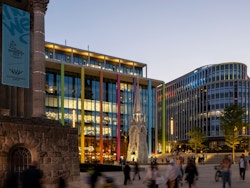
View of the rejuvenated Chamberlain Square

A vibrant Chamberlain Square during the 2022 Commonwealth Games
Working smarter in challenging times—the role of the independent design review
As cities increasingly struggle with resources and urban design expertise in planning and regeneration departments, the role of independent design and quality review panels is more important than ever in guaranteeing the quality of inner-city developments.
Historically, when cities had large and fully resourced planning departments, independent panels may not have held such great significance. Today, however, not every council can afford to have a full remit of qualified architects, town planners, engineers, and sustainability experts in-house. Design review panels frequently include every specialism from ecologists to highway consultants and flood risk engineers to conservation specialists—and cities stand to benefit hugely from plugging into this full range of expertise.
In particular, panels offer a chance for public sector planning departments to tap into private sector expertise and knowledge share with those working day-in day-out with complex urban developments. To retain quality through challenging times, they represent a great way for cities to work smarter. And yet, in many cases, despite the challenges local authorities face, review panels are still not utilised to their full advantage.
Drawing on our own experience at Howells, a good sounding board for an application is invaluable for architects and developers to gain wide-ranging advice on how to improve a proposal, to challenge their thoughts and to raise issues that may have been overlooked at the early design stages. Panels also serve to support planning departments with the very complex decisions they routinely face around issues such as high-density housing, public realm, and regeneration—building confidence, as well as encouraging better quality buildings and environments.
For cities like Birmingham, undergoing change at a phenomenal rate, it is more important than ever that local authorities engage in rigorous, fair, and open conversation about the built environment with experienced practitioners—and that they welcome and respond to challenges posed. What’s more, an independent design review panel offers the opportunity for cities from different parts of the UK undergoing similar challenges to learn from one another—on issues of sustainability, embodied carbon, landscaping, inclusivity, and wellbeing. With all of this on offer, city projects should never simply be the result of a conversation between architect and planner.
At a national level, with the conversations going on around design coding within the planning system, the role that independent panels can play may become more critical still. If these codes are too prescriptive, they inhibit innovation, but if they are not prescriptive enough, they leave room for misinterpretation. If we haven’t got the right governance to review prospective projects against national codes, we cannot build successful cities on the back of them. Getting design review panels to play a key role in translating design codes into built environments could then be crucial in helping the government to implement its ambitions of building quality alongside quantity.
Of course, as it stands, feedback from a design review is not binding in any way, and does not have to be adhered to. Each party can take away from it what they feel is valuable, from a sustainability, social, or city perspective, to improve the quality of a scheme. But it is very much in the hands of planning departments to encourage and support all major projects to engage with the process.
There is also the issue that design review panels can only be effective if they are relevant, and representative of the communities they serve, and the selection process is something that needs to be carefully considered. That’s why we have organisations like Frame Projects, which manages quality review panels for many London boroughs, to recruit panels impartially—seeking out the best balance of people, disciplines, perspectives, and backgrounds.
And finally, getting the dynamic right with an independent panel may itself be a process, but it is important to remember that a design or quality review panel is not there to cause hindrance to the planning process, it is there to enrich and to enhance it. A panel is there to play the role of critical friend—and every city can benefit from one of these.
Originally published in Building Design, 12 February 2024
Written on 12.02.2024, by Dav Bansal


